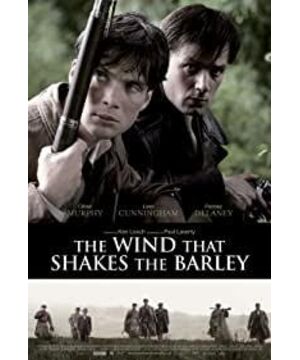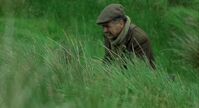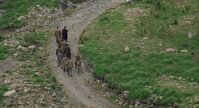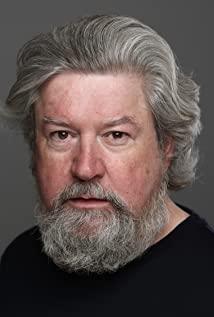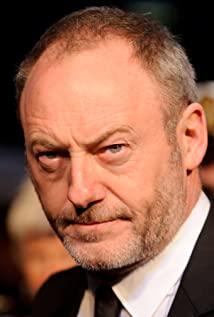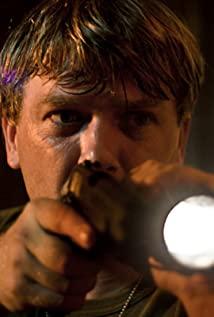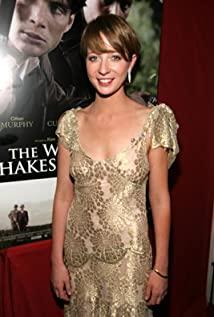The neighbor's playmate and stubborn boy Miha O'Sullivan faced insulting cross-examination by the notorious British Black-Brown Army. He refused to use English but insisted on answering his name in Gaelic, and was dragged into the chicken coop to be executed. Seeing this scene, Damien was still reluctant to join the Irish Republican Army and fight for independence alongside his brother Teddy. He wanted to rush back to the medical school in London to continue his studies, but he once again experienced the brutality of the British army at the train station. He also saw the fearlessness of the Irish compatriots, such as drivers and station masters, who refused to carry the British army. He stayed, got involved, and could never get out of this war anymore.
The film is divided by the signing of the Anglo-Irish Treaty in December 1921. This treaty allows 26 counties in southern Ireland to become a free state in the British Empire in accordance with the Irish Self-Government Act, but still requires allegiance to the British king; the six northern counties are still under British rule.
In the 20th century, the British were best at setting the flag of the former colonies, which was to sow the flames of civil strife when they evacuated. Damien and Teddy, as well as the Irish and the Irish brothers, started the wall. Did the Irish get what they got from the Anglo-Irish treaty enough for the sacrifices they made for it? If it is not enough (and indeed not enough), should they compromise?
The two most disgusting characters in the film gave different answers to this: Connery, the old leftist, called on people to continue fighting for a complete, but red Ireland in the tone of a mentor; Catholic priests arrogantly questioned the peace treaty. Damien roared: "Sit down, shut up, or get out" and claimed that every Catholic church was in favor of compromise. (The Catholic Church’s support for the Free State and the expulsion of anti-treaty fighters from the sacrament has indeed affected the attitude of many Irish people.)
Teddy put on the uniform of the newly formed Irish Government Army ("National Army"), and Damien chose to fight for Ireland's complete independence. This time, before attacking the British, he had to pass the level of his brother.
He failed to pass.
Thus, there was a scene at the end of the film: the brothers had a final conversation in the cell. The elder brother asked his younger brother to confess the whereabouts of the weapons hidden by the Republicans, and gave up the armed resistance against the British, and went home to be a good doctor and a good husband. Damien refused, and his own bullets were waiting for him.
The wind blows across the valley, across the wheat fields, across the brothers' Ireland.
Feng did not know why they had to go to the next step: both sides wanted to avoid civil war and planned to participate in the first general elections in the free states to form a coalition government. The free state government and the National Army that supported the treaty tried to agree to the republican constitution of the new country (without mentioning the British monarch) in exchange for a compromise with the leaders of the anti-treaty Republican Army, and the other side was ready to accept it. However, the Republican Constitution was vetoed by the United Kingdom for violating the Anglo-Irish Treaty, and the United Kingdom threatened to impose a trade blockade on the free states. The party supporting the treaty succumbed, in the name of the free state. This completely undermined the electoral agreement between the two factions. Both sides ran as rival parties in the Irish general election on June 18, 1922, and both sides called themselves Sinn Fein. The Sinn Fein Party, which was in favor of the treaty, defeated the anti-treaty Sinn Fein party by votes. The Republicans believe that "most people have no right to do wrong." The Irish Civil War broke out.
What Feng knew was: the civil war ended in 1923 and the Republicans were defeated; in 1949, with the recognition of the British, Ireland was completely independent; in 2005, the political organization of the Northern Irish Republican Army-Sinn Fein announced that it would lay down its arms and cease all armed activities. Peace finally came, but the Irish lost the six northern counties forever.
This "underestimated history" of Ireland is as chaotic and complicated as the history of every humiliated nation in the world. It is believed that the total number of people who died in the civil war on both sides far exceeds the previous Anglo-Irish war. During the Civil War, the Anti-Treaty Republican Army carried out political assassinations, burned and destroyed buildings, monuments, roads and railways, killed British Irish, royalists, and Protestants, and attacked landlords and landlords because of the leftist political creed of "fighting for the proletariat". Producers, these all make them quickly lose public support. The Free State government and the National Army also committed many atrocities: the Free State executed many well-known Republican prisoners (most of them were imprisoned at the beginning of the civil war, and therefore were not involved in the civil war), and the National Army often cruelly without trial The captured Republican soldiers were executed locally. After the Civil War, some Republicans returned to the political life of the country. Their political party, the Republican Party (split from the old Sinn Fein party), and the Unity Party formed by the party supporting the treaty, are still the two main political parties in Ireland. But the wounds of the civil war have not completely healed yet.
British director Ken Roach is quite objective and neutral in his grasp of the film scale, but it is not difficult to see that he gives more sympathy to his brother Damien. National struggle is inevitably mixed with the demands of class struggle, and even class struggle controls the direction and process of national struggle. This is a common phenomenon in the history of modern national independence movements. Although I have a natural sense of distrust of the political dogma and slogans of the left, I have to admit that Damien’s doubts are natural when faced with the hungry children and the old women who are forced to desperate by loan sharks in the film. : Independence, let alone this kind of severely compromised independence, can solve the problem of these hungry children and poor women? Of course, I believe that even if the red Ireland advocated by the revolutionary mentor Connery is built, it will not be possible. Therefore, even if we sympathize with Damien as emotionally as the director, intellectually, we should still see that the confused anger of Damiens is of no avail, compromise is necessary, and people long for peace. The prospect described by that disgusting priest is indeed more attractive to most Irish people (regardless of rich or poor)-accepting an imperfect treaty, so that there is no British patrol on the street, and people can go to work with peace of mind, go to school. Also, for noble purposes, a soldier should not be the first to aim his gun at his own person: the civil war was provoked by the Republicans. In April 1922, the Republican Army occupied the Four Courts in Dublin, and the Free State government resisted the pressure of the British and tried every means to avoid civil war. Churchill (yes, that's him!) warned the Free State that if he did not take action, he would send British troops to attack the Four Courts; in order to avoid a comeback of British troops, the Free State government launched shelling only after the ultimatum was invalidated. The civil war has begun.
In fact, the goals of the two sides are not fundamentally different: the National Army commander-in-chief of the Free State, Michael Collins (who was killed by a Republican ambush at his home during the Civil War) has been secretly planning an anti-British guerrilla war in the six northern counties, and stayed there. The Republican Army in the North provided weapons, and the Free State just wanted to be clear from them on the surface. If the civil war cannot afford, the next independence war is likely to break out in the six northern counties. Instead, the anti-treaty Republican Army’s excessive behavior made the six northern counties choose the United Kingdom: Britain and Ireland agreed that the ownership of Northern Ireland would be determined by the referendum of the six counties, and the six northern counties, with the majority of Protestants, were very worried about Irish nationalism. , They would rather stay in the UK.
History is so complicated and paradoxical.
In the film, the National Army soldiers arrive at Mein’s house to search, point their guns at the old and weak women and children, and let them hold their heads against the wall. This scene is exactly the same as what the British Black and Brown Army did. Many people can’t help but feel angry when they see this. rise. However, looking at history, I am afraid that the anti-treaty Republican Army has done more harm to ordinary people because their ideology is more radical, and they see more "enemies" in their eyes. It’s no wonder that at first they had the advantage of military power and they soon lost the support of most of the Irish people. Although director Ken Roach strives for justice, the film still reflects his stance toward the left, and he does not hesitate to use this film to echo the civil war in Iraq. So, I hope the audience can briefly review the painful history of the Irish Civil War, which will help us understand the chaos in Iraq today and recognize the demands of the Iraqi people. For the brothers in the film, I prefer Damien; but I don’t agree with his choice. Teddy was right, he should put down his weapon. Ireland needs a doctor.
However, I still remember that when the brothers and their comrades were arrested by the British, Damien once suggested to the British officer who interrogated him that he should be treated as a political prisoner, and the British officer responded with a violent beating. (They were fortunately released by a British soldier of Irish origin, but there were still a few comrades who could not escape and were executed.) When Teddy ordered the criminal team to shoot his brother, this "judgment" did not go through the court. If the indiscriminate killing of innocents is an unforgivable stain of the Republican Army, then the execution of a large number of Republican prisoners and prisoners of war by the Free State without trial is equally unforgivable. In Iraq, the opposition forces have become more tyrannical, but there are always elections and trials for the government. So, who should the Iraqis believe? The answer is self-explanatory in my opinion.
For the same period of history (and the same period of reality), everyone can have different opinions, and no one dares to say right or wrong.
The wind has blown through heavy wheat waves, and has also set off countless history. In history, there are always fratricidal brothers and sisters, and there are always old mothers who guard their broken homes and never abandon them. Except for killings, what remains unchanged are the green mountains and land, the wind blowing wheat waves, and the folk songs flying with the wind. The wind and folk songs are like weeping.
View more about The Wind that Shakes the Barley reviews


